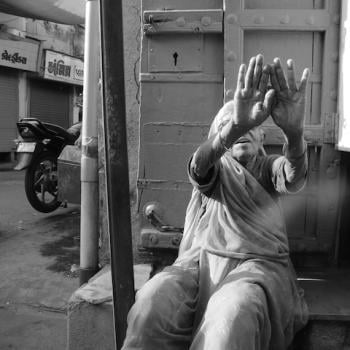
Excerpt from the book Copyright © 2025 by Karl Forehand
Is God Retributive or Restorative?
“Ours is a justice system that harms people
to show that harming people is wrong.” – Bryan Stevenson
In his famous Letter from the Birmingham Jail, Martin Luther King Jr. wrote, “Injustice anywhere is a threat to justice everywhere. We are caught in an inescapable network of mutuality, tied in a single garment of destiny. Whatever affects one directly affects all indirectly.”
Many segments of our population seek justice in various ways. Injustice seems to impact nearly everyone except those who superficially shield themselves with their power and privilege across all levels of our society.
We seek someone to blame for what happens to us and our loved ones, expecting them to pay for the pain they cause. We have been conditioned to believe in a specific kind of justice—an eye for an eye—which demands at least the same suffering that a person or institution inflicts upon us and those we care about. This response is natural and rooted in our evolution. We feel that if we don’t retaliate against whatever threatens us, they will harm us or someone else again. “Something must be done” serves as the rallying cry for the angry mob, a determined posse, and sometimes even religion.
One example of this is the Black Wall Street tragedy of 1921, when an armed mob attacked the prosperous Black community of Greenwood near Tulsa, Oklahoma. The turmoil stemmed from an accusation that a young Black man had assaulted a young White woman in an elevator. This allegation served as the spark that ignited chaos. Although it was later revealed that they were merely good friends or possibly even secret lovers, the fear, particularly among White women, intensified the tensions that ultimately led to the tragedy.
I believe everyone involved thought they were serving justice. An accusation based on presumption led to the complete devastation of a thriving community, resulting in a death toll estimated between 36 and 300. This incident serves as a potent reminder not only of racism but also of the consequences that arise when we rush to judge and see our only option as retribution.
What is Retributive Justice?
Retributive justice is a legal theory asserting that individuals who commit offenses and cause injustice should be punished in proportion to their crimes. The term originates from the Latin word “retribuere,” which means “to give back.”
Emily Thorne, the protagonist of the television series Revenge, delivers this line as a voiceover at the start of most episodes:
“In every life comes a day of reckoning—a time when unsettled scores demand retribution
and our own lies and transgressions are finally laid bare.” – Emily Thorne
I live in northwest Missouri, close to the borders of Nebraska and Iowa. The landscape here feels very open, and I can easily imagine how it must have looked during the Wild West and Prohibition eras. In the United States, we enjoy TV shows centered on revenge, and I can vividly picture the sheriff gathering a posse to track down the “bad” guys. Think of the movies we’ve watched where someone seeks vengeance for a family member’s injustice, goes on a rampage, causes significant property damage, and ultimately emerges as the hero, supposedly because “justice has been served!”
Retributive justice requires that punishment be proportional to the crime. Most societies appoint specific individuals to enforce this justice and ensure its fairness. Angry mobs sometimes go too far, harming innocent people in their rage. Retributive justice has been practiced throughout history, showing that this concept has often been used to justify military conflicts, genocide, and the mistreatment of those who are different from others.
Retributive justice has always been a part of our history, primarily because it is regarded as appropriate in our sacred texts and established standards of conduct. We accept it as a fundamental principle since it aligns with our natural inclination toward revenge and punishment. We acknowledge that it is only somewhat effective, addresses immediate concerns, and does not encourage positive, lasting solutions. Nevertheless, this has been our traditional approach, and punishing those who have wronged us feels justified.
A significant issue with retributive justice is its lack of focus on rehabilitation and the underlying causes of crime and injustice. While the fear of punishment deters many individuals, various circumstances can make someone feel they have no viable options. Consequently, the root causes of their criminal behavior may remain unaddressed, allowing for a recurrence. In cases of mass shootings, retributive justice may punish the shooter if they survive. However, in the United States, the focus often shifts to assigning blame rather than examining the underlying factors that could help prevent such incidents in the future.
Retributive justice in the United States and other countries is often applied unfairly to minorities and low-income individuals. Due to limited resources for self-defense, only 2-3% of crimes go to trial. Disadvantaged individuals frequently accept plea deals out of fear of facing harsher sentences, even when they are innocent of the charges.
Even domestic violence in the home can be seen as justice when we adopt a retributive model. Sometimes, parents may rationalize using violence against their children, believing it serves as an appropriate punishment for the perceived wrongdoing. According to the National Domestic Violence Hotline website, “On average, 24 people per minute are victims of rape, physical violence, or stalking by an intimate partner in the United States, which amounts to more than 12 million women and men over a year. Nearly 30% of women (29%) and 10% of men in the US have experienced rape, physical violence, and/or stalking by a partner. Just under 15% of women (14.8%) and 4% of men have been injured due to intimate partner violence that included rape, physical violence, and/or stalking by an intimate partner.”[1]
Historically, when communities come together, they also shape their views on justice. We often emphasize retributive justice as a crucial survival strategy. Those who commit injustices are seen as threats to the established community and society. After apprehending and punishing the offender, we sometimes realize that this method is ineffective in preventing future injustices or strengthening communities.
As with many other issues, finding better solutions often requires hard work.
What is Restorative Justice?
According to the Center for Justice Innovation, “Restorative justice offers a different way of responding to harm and conflict. Instead of relying on punishment as a response, restorative justice seeks to repair harm and prevent future harm by elevating the needs of those who have been harmed and inviting those who have caused harm into a process of active accountability.”[2]
In this system, all parties recognize the wrong that occurred and encourage the person responsible for the harm to accept accountability and acknowledge the impact. The parties collaborate to create a plan to repair the damage and prevent future incidents. This involves restitution, restoration, and reconciliation. The focus shifts from “giving them what they deserve” to intentionally concentrating on rebuilding the community and preventing such offenses from happening again.
Restorative justice can be effective because it helps repair relationships, rehabilitate offenders, and reduce recidivism, all contributing to a more just and equitable society. This approach involves the entire community working toward a more effective, positive, and lasting resolution instead of merely applying the immediate solution for punishing the offender.
A key component of restorative justice is relationships. When I lack a connection with my neighbor, it becomes difficult to understand their basic needs, which makes it easier to overlook them. People commit horrific acts against their neighbors and ignore the injunction to love them because they don’t honestly know them. Be careful not to assume that because you have a cohesive group that doesn’t intentionally harm one another, your group or individuals within it don’t harm others outside of it. Jesus challenged this assumption by encouraging his disciples to love their enemies, not just their neighbors and friends.
Once again, we arrive at the conclusion that effective, lasting solutions demand hard work. My friend Paula Stone Williams says, “Most of our problems can be solved by proximity and narrative.” Brené Brown states, “It’s hard to hate people up close.” However, problems don’t get resolved with proximity alone—they also require the correct narrative, which has been fractured for a long time, even in our holy books.
The Role Religion Plays
Religion often promotes retributive justice by creating narratives about its gods, depicting them as just, and viewing appropriate justice as divine retribution. This reinforces the belief that wrongful actions should lead to negative consequences. This theme is especially prominent in Abrahamic religions such as Judaism, Christianity, and Islam, where scriptures frequently recount stories of divine punishment. While we refer to this as retributive justice, it can sometimes extend even further.
In my Christian tradition, it was easy to argue that one could suffer eternally, even for the slightest transgressions. In the Hebrew scriptures, children were often killed for their parents’ sins, and many people were brutally murdered for offending the wrong individual or for failing to honor the Hebrew God, Yahweh.
While modern Christians may seek a more restorative view of justice from Jesus, they also base their understanding of God on the Old Testament principle of “an eye for an eye.” Although Jesus approached certain Hebrew Scriptures from a different perspective—sometimes making them feel less retributive and more restrictive at other times—he still emphasized that merely contemplating an action could be equivalent to committing the offense, thereby warranting greater punishment. For instance, he expressed this perspective clearly in his sermon, the Sermon on the Mount.
Religious views on crime and punishment can sometimes appear contradictory and support the notion of divine retribution; however, they often struggle to define what constitutes a crime and the appropriate punishment clearly. In my tradition, the Bible offers conflicting and perplexing interpretations, depending on the reader and their cultural perspective. This portrayal of God shifts between a frightening monster and a compassionate savior.
Most religions define violations based on their interpretations of deities. While many view God as understanding, compassionate, and often forgiving, they also perceive Him as retributive, sometimes angry, judgmental, and unpredictable. Over time, these traditions have developed concepts of post-life punishment if their conditions for salvation or deliverance are not fulfilled. For Christians, the notion of hell has evolved into the belief in eternal conscious torment, even for minor offenses.
Of course, many of these systems advocate for deliverance from retribution. However, the explanations can be confusing, and everyday practices often contradict the resolutions that sacred texts prescribe for their followers.
My Experience
After serving as a pastor for 20 years, I pondered the question, “Is God primarily retributive or restorative?” It was quite perplexing to consider this question because Jesus presented a vision of restoration, forgiveness, and mercy. However, the Christians I knew also expected God to punish their enemies, which included most people outside their close circle.
While I understand that the core concepts of forgiveness and mercy can restore individuals to proper relationships with one another—and perhaps with God—I didn’t see this reflected in my country or the world. Atheists, agnostics, and individuals from other religions often exhibited more love, kindness, and forgiveness than the Christians I knew. They believed that God would somehow be restorative for them while being retributive toward nearly everyone else.
Not only did I see little evidence of a restorative God, but I could easily disprove it using their own scriptures. Through careful study, I soon realized that scriptures tend to evolve over time and depend much more on their culture and origins than on any divine message from the gods they created.
When I concluded that the ideal God should be uniquely restorative rather than retributive, I thoroughly searched for evidence to support this belief. As I mentioned earlier, finding compelling physical evidence was challenging, even from the heroes of faith. They sometimes exhibited a retributive nature and only expressed love and forgiveness toward those nearest them.
I also researched historical evidence and found that in most wars, the ultimate expression of retribution was instigated by religious individuals who believed they were right, and that God was on their side. Did you know that a significant portion of Hitler’s army was composed of Protestant and Catholic Christians? I didn’t know that until I questioned this and sought the answer.
As a pastor, I emphasized love, compassion, and mercy. Christians wanted to believe this about their God, so I embarked on a journey with the three churches I led. However, when I asked the question sincerely and researched it thoroughly, I realized that if God truly exists, the narrative is so fundamentally misguided that it only frustrated me to try to change it within the constraints of religion. Like people, religions resist change and often hesitate to reconsider their beliefs. So, I left and began searching for something that made more sense.
In my book Apparent Faith, I posed a similar question: “Shouldn’t God be better than I am?” This was followed by the question we are exploring: “Is God retributive or restorative?” As I continued to seek answers, I realized it is inconsistent to claim that the source of everything could be both. I believe two paths lead in opposite directions and cannot be seen as equally just.
Continue to question the justice of the God narrative that you received.
Questions About Questions
What belief(s) did you inherit concerning this question?
How is your response to this question changing?
[1] https://www.thehotline.org/resources/getting-help-for-a-friend-in-need/
[2] https://www.innovatingjustice.org/areas-of-focus/restorative-justice
Learn to be Where You Are (Presence)
Learn to be Who You Are (Authenticity)
Finding Regulating and Somatic Healing
Are you serious about deconstruction and asking bigger questions?
If that’s the case, this book was created for you. As a former pastor, I made the mistake of deconstructing a bit and then trying to start something new, as I was trained to do. The problem with that approach is that I wasn’t ready to begin something new.

I hadn’t delved deeply enough or asked enough questions. The first stage of deconstruction typically includes assessing our beliefs regarding hell and the afterlife, supporting queer individuals and women in their fight for equality, and achieving a better understanding of racism and privilege.
Many people in deconstruction communities expend significant effort criticizing Evangelicals and attempting to gain a following. While I believe they deserve intense criticism, this strategy fails to effectively tackle the problem because they generally don’t listen to us!
Our tendency to punish our former organizations sometimes overlooks the challenging process of healing and growth. It is the same trap we fell into in our former associations.

Campfires occupy a special spot in the mosaic of history. They act as communal hubs across different cultures and faiths. The campfire’s circular design fosters equal participation within the collective group. The flames at the center draw our focus and encourage face-to-face interactions as we exchange experiences, wisdom, and insights about the world beyond. It is where legendary myths and tales are born.
Order Now – Study Questions in each chapter!
This book is named Campfires in the Desert as it stems from nearly 400 discussions we held with individuals on our podcast, The Desert Sanctuary, and our aspiration to improve.
Available now!
Thanks for considering us, autographed copies are $20
Karl Forehand Campfires in the Desert – A Soft Book Release. Karl Forehand is a former pastor, podcaster, and award-winning author. His books include Out into the Desert, Leaning Forward, Apparent Faith: What Fatherhood Taught Me About the Father’s Heart, The Tea Shop, and Being: A Journey Toward Presence and Authenticity. He is the creator of The Desert Sanctuary podcast and community. He has been married to his wife Laura for 35 years and has one dog named Winston. His three children are grown and are beginning to multiply! You can read more about the author here.














